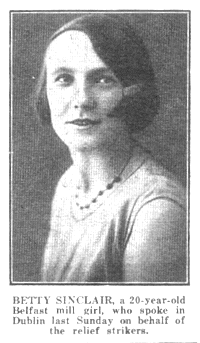Betty Sinclair facts for kids
Quick facts for kids
Betty Sinclair
|
|
|---|---|

c. 1930–31
|
|
| Born | 3 December 1910 |
| Died | 25 December 1981 (aged 71) Belfast, Northern Ireland
|
| Occupation | Political organiser |
| Political party | Communist Party of Ireland |
Elizabeth Margaret Sinclair (born December 3, 1910 – died December 25, 1981) was an important Irish political organiser. She spent her life working for better rights for workers and for civil rights in Northern Ireland.
Early Life and Political Beginnings
Betty Sinclair was born in Belfast on December 3, 1910. Her family was from the Church of Ireland. Her father, Joseph Sinclair, worked as a sawyer. Her mother, Margaret, also worked in a mill.
Betty left school when she was 15 years old. She started working in a mill, just like her mother. In 1932, she joined a group called the Revolutionary Workers' Groups (RWG). This group wanted to improve conditions for working people.
In 1933, Betty helped organise the Outdoor Relief Strike. This strike was about getting help for people who were unemployed. After this, she went to a special school in Moscow until 1935. There, she learned more about political organising.
The RWG later became the Communist Party of Ireland (CPI) in 1933. Betty became a very important member of this new party. In 1941, she became a full-time worker for the party in Belfast.
Working for Change During and After the War
In 1941, the Communist Party of Ireland (CPI) split up. Betty remained a very active member of the Communist Party of Northern Ireland (CPNI). She worked as the Secretary for this party from 1942 to 1945.
Betty also ran for election in 1945 in Belfast Cromac. She received a lot of votes, showing her popularity.
In 1947, Betty became the full-time secretary of the Belfast and District Trades Union Council. This council was a group that worked to protect the rights of workers in the Belfast area.
Betty also worked to help the American musician and activist Paul Robeson. He was a famous singer who supported civil rights. The US government had taken away his passport. Betty campaigned to get his passport back. In 1958, she met Paul Robeson when he visited Belfast.
Later Years and Legacy
In 1967, Betty Sinclair was a representative for the Trades Council. She helped to create the Northern Ireland Civil Rights Association (NICRA). This group worked to get equal rights for all people in Northern Ireland.
Betty was the chair of NICRA until 1969. She then left the group. She felt that the group was becoming too extreme and was making divisions worse.
In 1975, Betty stepped down from her job at the trades council. She moved to Prague for a while. There, she worked for a magazine called World Marxist Review. Later, she returned to Belfast.
Betty Sinclair passed away on Christmas Day in 1981. She died from smoke inhalation after a fire in her flat in East Belfast. Betty Sinclair is remembered for her dedication to improving the lives of working people and fighting for civil rights.

